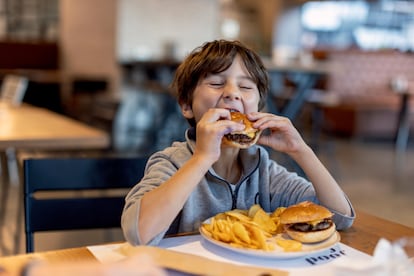Tackle the junk food issue at home: Ditch the ban and rethink the reward
Too much fast food can lead to obesity and cardiovascular problems; encouraging healthy eating habits from a young age is crucial

In the age of instant gratification, everyone wants fast food. But these foods are often highly processed and contain harmful preservatives and additives. Excessive junk food consumption contributes to obesity, which has become a significant health issue for children worldwide. In Europe, 28% of children between the ages of seven and nine are overweight. In the United States, for children and adolescents aged 2-19 years the prevalence of obesity was 19.7% and affected about 14.7 million children and adolescents, according to the CDC.
“Frequent consumption of fast food increases the risk of overweight, obesity, high blood pressure and diabetes,” said dietician and nutritionist Ana Isabel Haddad. “Establishing healthy eating habits during childhood and adolescence is crucial, as they shape a child’s future health.”
What is junk food? “These foods are quick to prepare but low in nutritional quality. They’re high in energy, low in nutrients, and contain harmful saturated or trans fats, as well as added sugars,” said nutrition expert Rosaura Leis. “In most cases, fast food is junk food,” said Haddad.
A fast-food diet is not recommended for children, although it can be consumed occasionally. “It’s best to limit it to twice a month while emphasizing the importance of healthy eating habits. Alternatively, you can try preparing like burgers, pizza and potatoes at home using high-quality ingredients,” said Leis. Parents should educate their children about the importance of a balanced diet for good health, particularly when it comes to junk food. “Food shouldn’t be seen as a punishment or reward, but as a basic necessity for well-being. Encouraging healthy eating habits from a young age is crucial.”
It’s important to teach children about all the healthy and unhealthy foods that are available, which helps them understand the impact on their health. “We should emphasize that there is no good or bad food and avoid restrictions that can lead to harmful obsessions with banned foods,” said nutritionist Laura Lorente. She offered the following guidelines to educate children about nutrition and prevent unhealthy junk food consumption.
- Avoid eating quickly, as it can indicate anxiety about snacking and feelings of guilt. To slow down, try placing your utensil on the table after each bite, and wait a few seconds before taking another one.
- To enjoy mealtimes, pay attention to details like sitting properly, using utensils, and eating at a table in the kitchen or dining room. Avoid distractions like using your phone.
- Try eating together as a family because it’s a pleasant social activity, not just a physical necessity.
- Make delicious food like vegetarian pizza at home using high quality ingredients. It’s a great way to bond as a family.

“We shouldn’t overly stigmatize junk food, but we should also ensure that it’s not a regular part of our diets. If a child wants to eat it occasionally, it’s better to allow it sometimes to prevent guilt feelings,” said Llorente. She also recommends not associating junk food with certain emotions. “When good behavior is rewarded with junk food, it becomes associated with positive experiences and emotional states, like euphoria.” A healthy diet should flow naturally. “Don’t be too intolerant and allow your children to enjoy the foods they like at special events like a friend’s birthday. Good health encompasses more than just weight, food and exercise.”
Is fast food addictive?
There’s controversy over whether junk food is addictive. “Currently, we lack conclusive evidence to prove that substances in fast food have addictive effects, meaning they create physical or psychological dependence,” said Haddad, who associates the compulsion to eat fast food with other factors. “Unhealthy eating habits and opting for speed and convenience can be challenging habits to change.” However, research has identified some aspects of fast food that compel people to eat more. “They contain a lot of sugar and are not usually very filling, which makes people want to eat more. The same is true of sugary beverages and juices,” said pediatrician Rosaura Leis, who recommends avoiding frying in favor of other cooking methods.
Sign up for our weekly newsletter to get more English-language news coverage from EL PAÍS USA Edition
Tu suscripción se está usando en otro dispositivo
¿Quieres añadir otro usuario a tu suscripción?
Si continúas leyendo en este dispositivo, no se podrá leer en el otro.
FlechaTu suscripción se está usando en otro dispositivo y solo puedes acceder a EL PAÍS desde un dispositivo a la vez.
Si quieres compartir tu cuenta, cambia tu suscripción a la modalidad Premium, así podrás añadir otro usuario. Cada uno accederá con su propia cuenta de email, lo que os permitirá personalizar vuestra experiencia en EL PAÍS.
¿Tienes una suscripción de empresa? Accede aquí para contratar más cuentas.
En el caso de no saber quién está usando tu cuenta, te recomendamos cambiar tu contraseña aquí.
Si decides continuar compartiendo tu cuenta, este mensaje se mostrará en tu dispositivo y en el de la otra persona que está usando tu cuenta de forma indefinida, afectando a tu experiencia de lectura. Puedes consultar aquí los términos y condiciones de la suscripción digital.









































